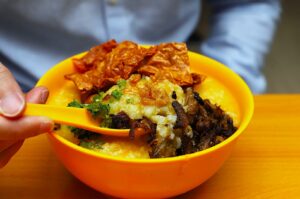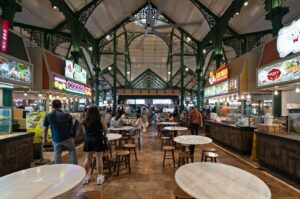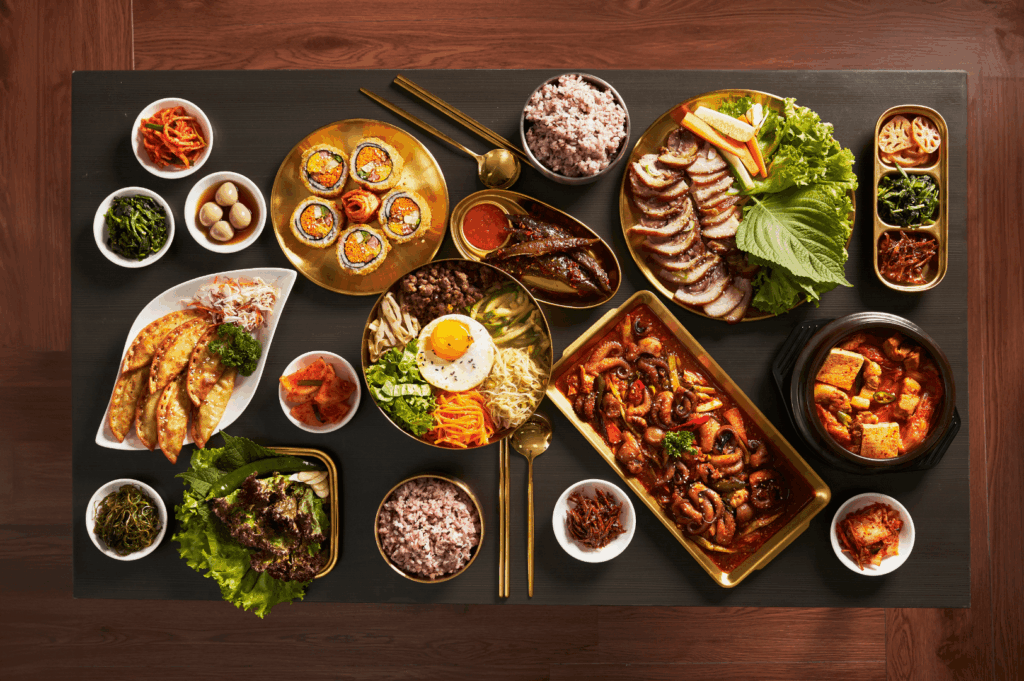
Beyond the Hallyu Hype
Whilst Korean pop culture has undoubtedly sparked global interest in all things Korean, the nation’s cuisine stands firmly on its own centuries-old foundations. Hansik, the traditional Korean culinary philosophy, predates any cultural wave by millennia, built on principles of seasonality, fermentation mastery, and communal dining that create profound connections between food and community.
Singapore’s Korean cuisine in Singapore scene reflects this authentic depth beautifully. From sizzling BBQ grills in Tanjong Pagar to temple-style vegetarian restaurants tucked away in quiet neighbourhoods, the island offers genuine Korean dining experiences that extend far beyond trending dishes. Street snack stalls serve comfort foods that have sustained generations, whilst contemporary bistros honour traditional techniques through modern presentations.
For another lens on Singapore’s living food heritage, explore the layered stories and must-try dishes in our guide to Peranakan cuisine in Singapore.
The Korean Flavor Code: Balance, Depth, and Contrast
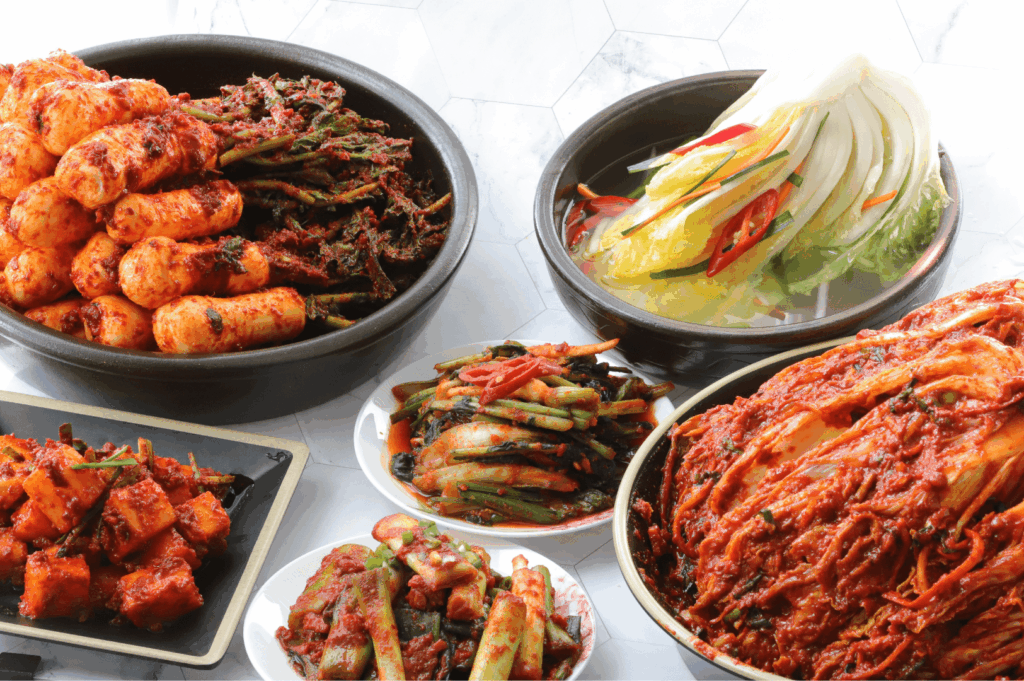
Korean cuisine operates on a sophisticated flavour philosophy that creates harmony through contrast. Each meal seeks to balance opposing elements—spicy and cooling, fermented and fresh, rich and clean—resulting in deeply satisfying dining experiences that engage all the senses.
Fermentation as a Flavour Engine
Time transforms simple ingredients into complex flavour powerhouses through fermentation. Kimchi develops its signature tang and depth through weeks of careful aging. Gochujang evolves from basic chilli paste into a nuanced condiment balancing sweet, spicy, and umami notes. Doenjang and ganjang (soy sauce) contribute profound savouriness that anchors countless dishes.This patience-dependent process creates flavours impossible to replicate through quick cooking methods. Each fermented ingredient adds layers of umami that build upon each other throughout a meal.Heat with Restraint
Korean spice philosophy prioritises depth over simple heat intensity. Rather than overwhelming the palate, chillies work alongside other ingredients to create warming sensations that enhance rather than mask other flavours. This approach layers spice with savoury, sweet, and sour elements, creating heat that invites rather than challenges.What “Korean Dining” Means: The Joy of the Shared Table
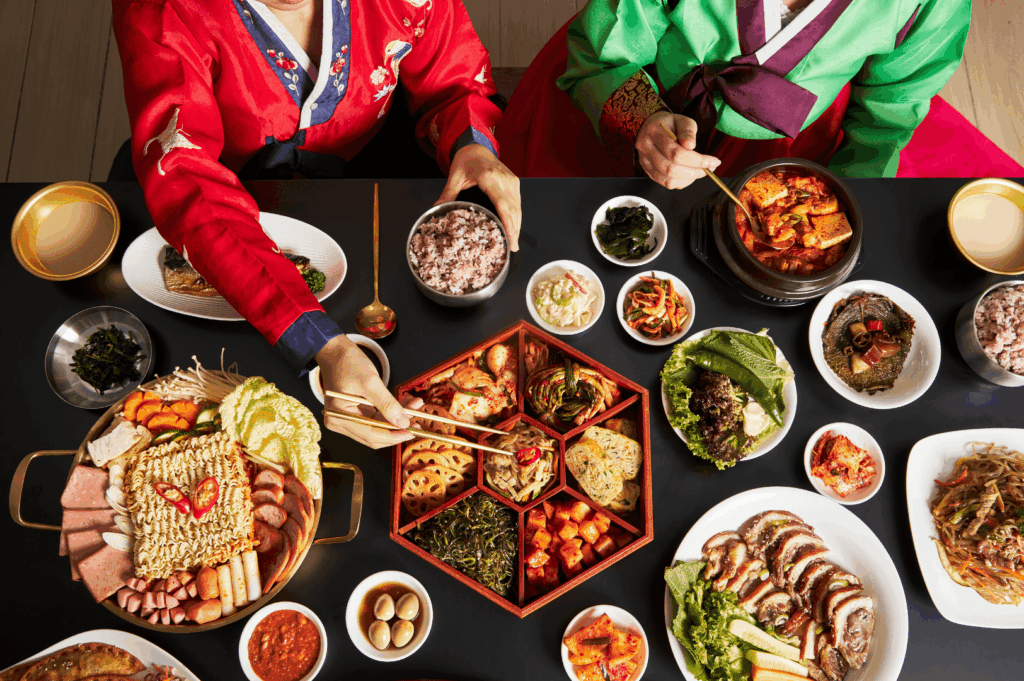
Korean meals centre around communal sharing, transforming dining from mere sustenance into social bonding. This approach shapes both the food preparation and the eating experience itself.
Banchan 101
Small side dishes called banchan rotate throughout Korean meals, providing endless variety and nutritional balance. These might include pickled vegetables, seasoned greens, marinated proteins, or fermented preparations. Banchan ensures each bite offers different textures and flavours, preventing palate fatigue whilst encouraging conversation and shared discovery.
The beauty lies in their complementary nature—cooling cucumber kimchi balances fiery stews, whilst nutty sesame spinach provides earthy contrast to grilled meats.
Ssam Culture
The Korean practice of ssam involves wrapping cooked foods in fresh lettuce or perilla leaves with rice, ssamjang (seasoned paste), and kimchi. This creates personalised flavour combinations whilst adding refreshing crunch and cooling elements to rich dishes.
Ssam transforms every meal into interactive dining, encouraging diners to experiment with different combinations and find their preferred flavour profiles.
Rice and Grains
Steamed white rice anchors most Korean meals, providing a neutral canvas for bold flavors. Multigrain bap incorporates barley, beans, and other grains for added nutrition and texture. These staples frame the menu structure, with other dishes designed to complement rather than compete with the grain foundation.
Foundations of Flavour: The Korean Pantry
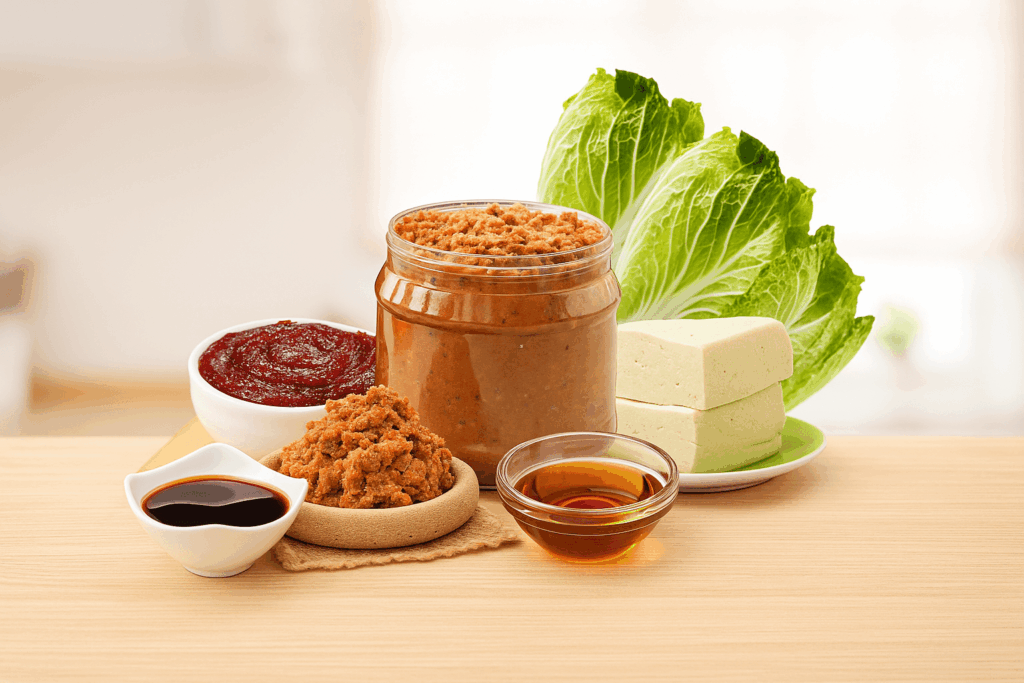
Korean cuisine is built upon a pantry of foundational ingredients, each bringing unmistakable identity and depth to the table. At the heart of Korean cooking are fermented pastes—gochujang (spicy-sweet chili paste) and doenjang (earthy soybean paste). Gochujang lends its signature sweet heat and umami to classics like bibimbap, spicy tteokbokki sauce, and marinated chicken, while doenjang forms the backbone of comforting stews such as doenjang jjigae, where its rustic flavor is mellowed by tofu and vegetables.
Ganjang, or Korean soy sauce, is more than a seasoning; it imparts saltiness and depth to everything from bulgogi marinades to the dipping sauce for steamed dumplings or seafood pancakes. This soy sauce differs from its Japanese and Chinese counterparts, often boasting a rounder, slightly sweeter flavor that harmonizes with Korean dishes.
Sesame oil is another indispensable component—it infuses warm, nutty notes into fried rice, japchae noodles, seasoned namul (vegetable sides), and even finishing touches on bibimbap. A few drops can transform the aroma and character of a dish, adding to the overall complexity.
Anchovy and kelp stock (myeolchi-yuksu and dashima-yuksu) are the silent heroes of Korean soups and stews. This stock, brewed from dried anchovies and kelp, becomes the base for jjigae (hearty stews), guk (clear soups), and even kimchi jjigae, imparting a subtle briny depth that underscores many comforting Korean dishes. Without this umami-rich broth, the flavors of classics like soondubu or kal-guksu would feel noticeably flat.
The breadth of the Korean pantry extends beyond these essentials, but their interplay is at the heart of Korean cooking—layering savory, spicy, salty, and nutty notes. Mastery of these ingredients allows Korean chefs to create dishes that are both bold and balanced, providing endless possibilities for layering flavor and satisfying every palate.
If spice architecture fascinates you, don’t miss our deep dive on Indian cuisine in Singapore, where we unpack essential spices, regional styles, and where to taste them.
Korean BBQ: Theater, Aroma, Technique
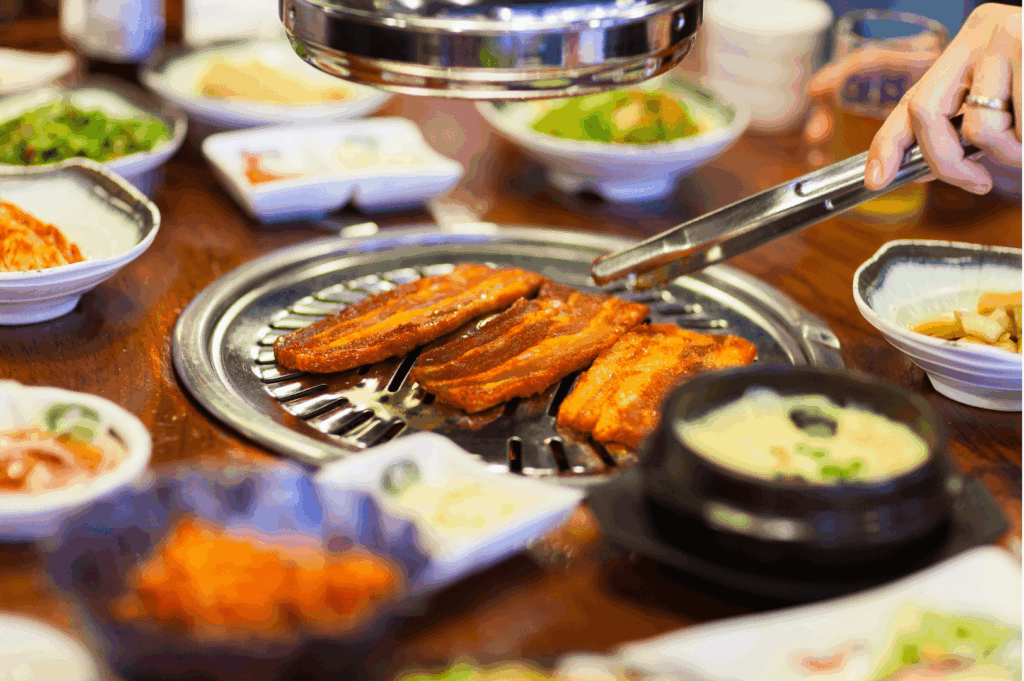
Korean BBQ in Singapore is more than a meal—it’s an interactive culinary show. Visiting a top Korean BBQ restaurant is an experience for all the senses: the sizzle of premium meat cuts on the tabletop main grill, the aroma drifting up from Korean charcoal BBQ, and the camaraderie of sharing platters make it a favorite for gatherings and special occasions. Guests can choose from generous BBQ menus, la carte items, or order BBQ sets tailored for groups.
The following are some of the top picks for the best Korean BBQ experience you can find in Singapore:Don Dae Bak
Known for its attentive service and flavourful marinades, Don Dae Bak offers high-quality offerings such as pork belly, beef brisket, and sharing platters. With its classic interior and grill-centered tables, it’s a popular spot for both meat lovers and first-time diners. Look for free flow eggs, a broad ala carte menu, and bbq sets ideal for group gatherings.Charim Korean BBQ
Charim Korean BBQ stands out with its premium meat cuts, detailed banchan, and customisable BBQ menu. Marinated chicken, beef short rib, and pork collar feature alongside seafood selections for a well-rounded experience. The Clarke Quay location is perfect for lively nights with friends or colleagues, and their attentive service adds to the appeal.Hanjip Korean Grill House
Boasting private dining rooms and a sleek contemporary vibe, Hanjip Korean Grill House caters to those seeking a premium or special occasion meal. Highlights include USDA prime beef, woo dae galbi, and kurobuta Berkshire pork. A diverse selection of bbq sets, sharing platters, and la carte options means the menu offers plenty for every preference.With K-BBQ restaurants spread across Clarke Quay, Jalan Jurong Kechil, Rochester Chingu, and more, Singapore’s Korean BBQ scene delivers everything from intimate settings to spacious venues equipped with modern BBQ amenities. For meat lovers and the BBQ-curious alike, exploring these establishments is the perfect introduction to the variety and depth of Korean barbecue culture in Singapore. Soulful Bowls and Everyday ComfortsCuts to Know
Samgyeopsal (pork belly) offers rich, fatty satisfaction when grilled to crispy perfection. Galbi (short ribs) provide tender sweetness from their marinade, whilst bulgogi delivers umami-rich beef in thin, quickly-cooked strips. LA Galbi presents cross-cut ribs for faster cooking and easier eating.Seafood options like grilled prawns or squid add lighter alternatives to the meat-focused selections.Soulful Bowls and Everyday Comforts
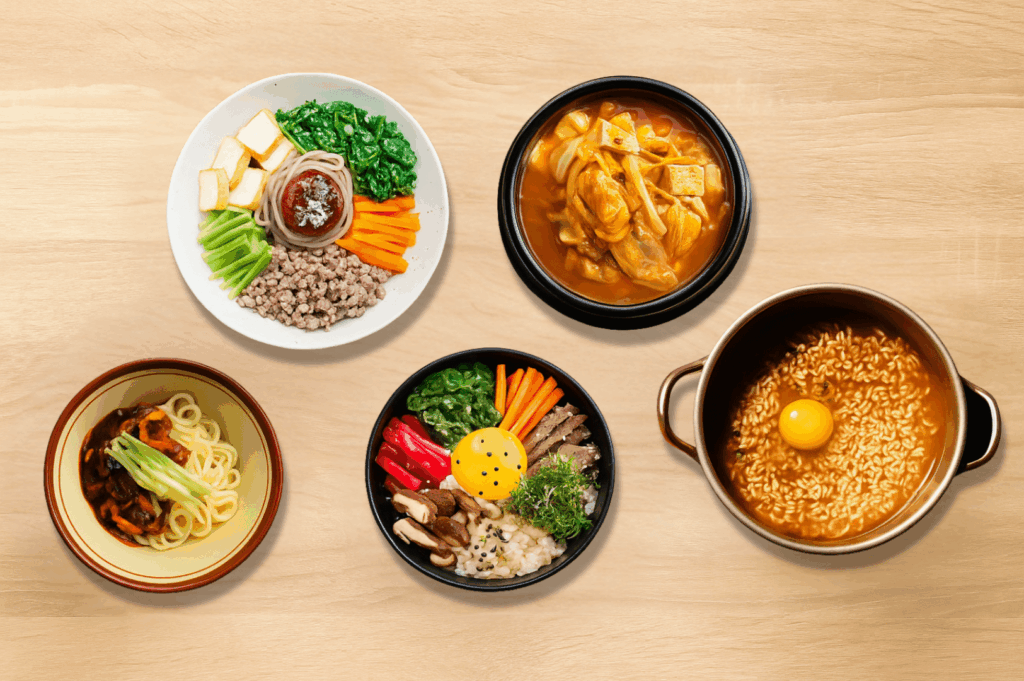
Korean comfort foods provide warming satisfaction through carefully balanced ingredients and textures.
Bibimbap & Dolsot Bibimbap
Bibimbap presents Korea’s philosophy of balance in a single bowl. Seasoned vegetables (namul), protein, rice, and a fried egg create customisable harmony when mixed with gochujang. Dolsot bibimbap serves the same ingredients in a sizzling stone pot, creating crispy rice bottom and theatrical presentation.Stews & Casseroles
Kimchi jjigae transforms aged kimchi into soul-warming stew with pork and tofu. Soondubu features silky soft tofu in spicy broth, often topped with a raw egg that cooks in the heat. Doenjang jjigae offers vegetable-rich comfort through fermented soybean paste base.Noodles
Japchae provides sweet potato starch noodles with vegetables in sesame-soy dressing. Naengmyeon offers cold buckwheat noodles perfect for warm weather. Kal-guksu features hand-cut wheat noodles in warming broth.Street Food Spirit: Casual, Playful, Irresistible
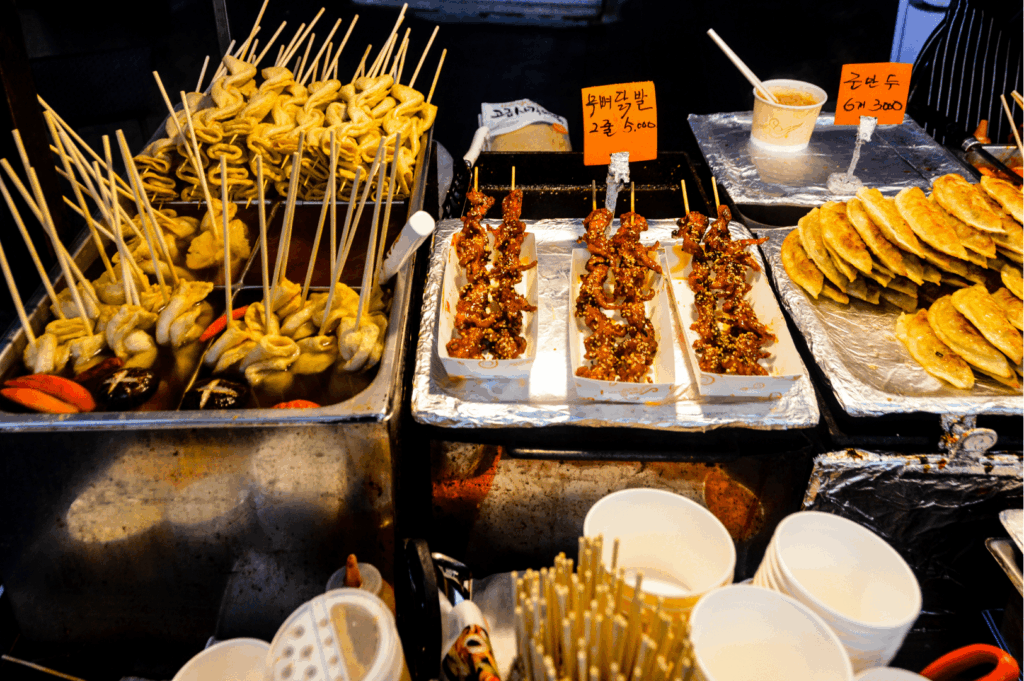
Korean street foods embody the cuisine’s playful side whilst maintaining serious flavour commitment. Tteokbokki transforms rice cakes into spicy, chewy satisfaction. Hotteok provides sweet pancake comfort with brown sugar filling. Various Twigim (fried items) offer crispy textures, whilst Gimbap creates portable rice roll convenience.
Eomuk skewers provide warming fish cake satisfaction in flavourful broth, perfect for Singapore’s air-conditioned environments.Best Korean Cuisine in Singapore: Beyond the Grill — Stews, Noodles & Seafood (and Beyond)
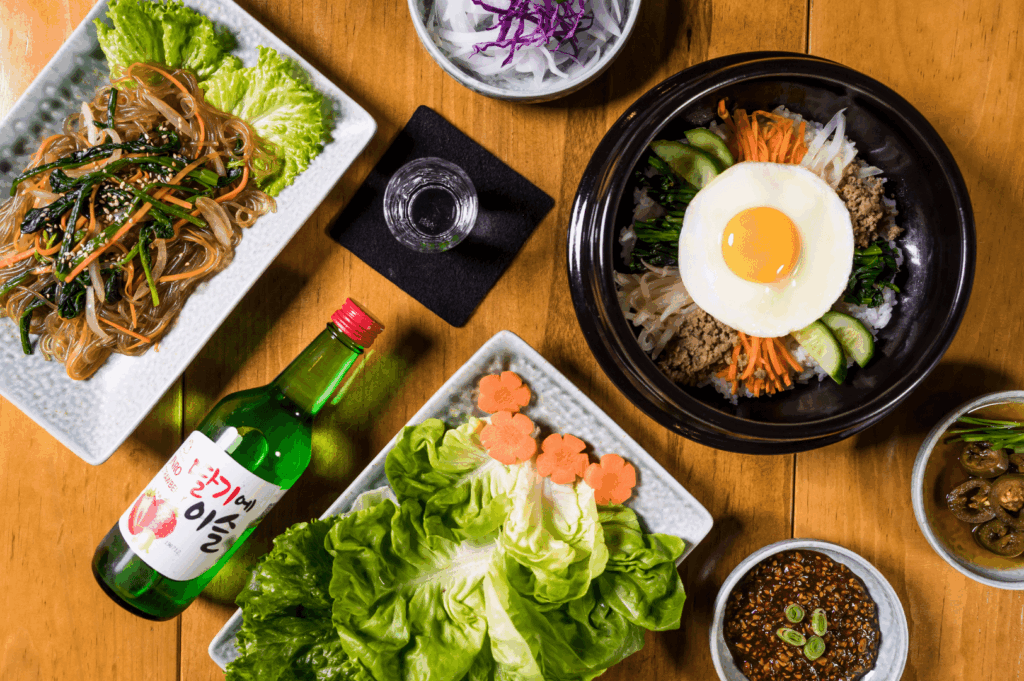
The diversity of Korean cuisine in Singapore means there’s something for every palate and occasion, from lively BBQ enclaves to intimate private dining rooms. If you’re skipping K-BBQ, Singapore still serves a deep bench of Korean dining: homestyle jjigae (stews) and guk (soups), hand-cut kal-guksu noodles, market-style seafood spreads, and polished, modern kitchens translating Hansik into tasting menus.
Here are three standout, non-BBQ spots to put on your list:
NAE:UM (Telok Ayer)
A refined, modern Korean restaurant where multi-course menus are built around seasonal produce, fermentation, and memory-driven “chapters.” Expect clean, layered flavors—jang-based sauces, precise seafood cookery, and elegant plating that shows Korean cuisine is as thoughtful as it is comforting.
Meta (Keong Saik)
Contemporary Korean-inspired fine dining guided by produce and technique. The tasting menu weaves Korean flavors through modern preparations—think depth from gochujang/doenjang, delicate seafood, and exacting balance—making it a sophisticated way to experience Korean cuisine beyond the grill.
Anju (Tanjong Pagar)
Stylish and share-friendly, Anju leans into modern Korean plates: vibrant banchan, hearty stews and noodles, crisp jeon (pancakes), and jang-led sauces that bring umami without heaviness. Ideal for groups who want variety—comforting classics, refreshed for today.
Beyond grilled meats, you’ll find specialty stew and noodle houses serving comforting korean dishes like kimchi stew or kimchi fried rice, as well as restaurants such as seoul restaurant and pohang seafood, where standout seafood pancakes and seasonal ingredients feature on their set or ala carte menus.
Many popular Korean restaurants in Singapore also offer versatile dining options, from generous buffet menus perfect for groups to lunch sets offering good value. Don’t miss the a-la carte options that let you sample a wide range of sharing dishes or explore the specialties at hidden gems with regulars-favorite set menus.
Korean Cuisine: More Than a Trend—A Table You’ll Return To
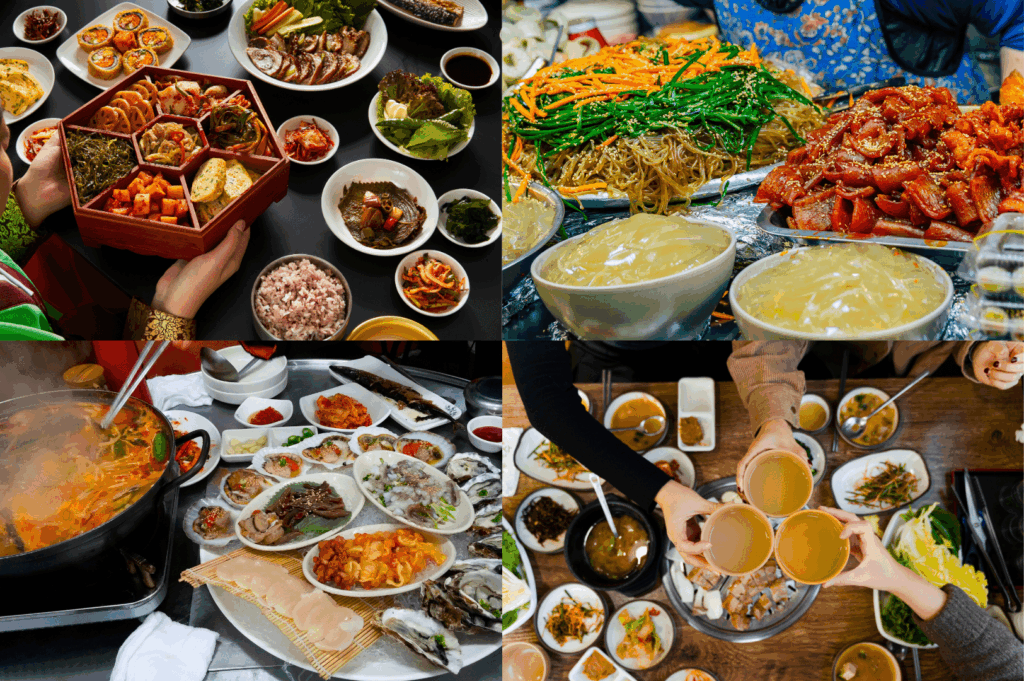
Korean cuisine endures because it combines centuries-refined craft with genuine community spirit and deeply satisfying comfort. The best Korean restaurants in Singapore succeed by honouring these traditions whilst adapting to local tastes and ingredients.
Start your Korean culinary journey with a first-timer set that includes BBQ, soup, and banchan selections. Once comfortable with these foundations, explore regional specialties and temple cuisine that showcase the full breadth of this remarkable culinary tradition. You’ll discover why Korean dining creates lasting memories that extend far beyond any cultural trend.Conclusion
Thai cuisine in Singapore exemplifies how perfect flavour harmony can captivate diverse audiences whilst maintaining cultural authenticity. The continued growth of thai restaurant establishments across the island demonstrates how these complex taste profiles have found their place in Singapore’s multicultural food landscape. From humble thai street food stalls to michelin guide recognised establishments, the commitment to balancing sweet, sour, salty, and spicy elements ensures that every thai dining experience offers something special. We encourage readers to venture beyond familiar dishes and explore the full spectrum of thai cuisine available in Singapore—your taste buds will thank you for the adventure.
